#Marie-Madeleine de La Fayette
Text
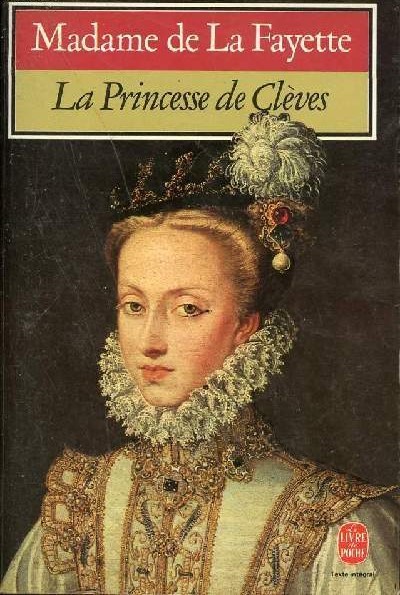
La Princesse de Clèves (1678) - Madame de La Fayette
Je n'ai que des sentiments violents et incertains dont je ne suis pas le maître.
//
My thoughts are violent and uncertain, and I am not able to control them.
#Madame de La Fayette#La Princesse de Clèves#The Princess of Cleves#french literature#novel#book#reading#roman d'analyse#Marie-Madeleine de La Fayette#women authors#Entsagungsroman#read in st louis and montreal#read in october 2023
2 notes
·
View notes
Note
When in the library I found a novel with مدام لافييت "Madame de La Fayette" on it, and it got me excited even that it is more than probable that the author has nothing to do with the Lafayette I thought of, turns out there was a relation! I researched about a little while studying and apparently a woman in an older generation of La Fayette family (Marie-Madeleine Pioche de La Vergne, Comtesse de La Fayette) wrote it, her novel (La Princesse de Clèves (1678)) is considered the first french historical novel???? (basically historical fiction retelling with an OC).. she's not his grandmother or blood related in any way but I think it's a cool fact
Dear Anon,
that is indeed quite interesting, is it not?
Madame de La Fayette was the Marquis de La Fayette’s great-aunt (or there about, the family tree is a bit confusing around that time) by marriage, although her husband was not really a great catch. She published her books, most noticeable among them La Princesse de Clèves, anonymously but they were soon attributed to her. Her works in general and La Princesse de Clèves in particular, are a firm part of the French canon of classic literature.
Her main protagonists were all made up, but the setting and the supporting characters were all taken from history and the novel was lauded for its accuracy.
As far as I know, Madame de La Fayette’s works belonged to the first of its kind not only in France but in Western literature in general.
I hope you have/had a lovely day! :-)
#ask me anything#anon#marquis de lafayette#la fayette#french history#literature#madame de la fayette#la princesse de clèves
17 notes
·
View notes
Video
youtube
Madame de La Fayette Sa vie -
E LA STORIA DI ENRICHETTO E TUTTTI I CATTOEBREI LA RISCRIVEREMO NOI
Marie-Madeleine seguì il patrigno nel suo esilio e ritornò a Parigi solo per il matrimonio con François Motier, conte di La Fayette.
diciotto anni più vecchio di lei, nacquero due figli. Per i primi anni i due vissero insieme in campagna. Successivamente Marie-Madeleine tornò a Parigi e, divenuta dama di corte di Enrichetta d’Inghilterra, visse separata da suo marito, anche se mantenne sempre con lui dei rapporti di amicizia e continuò ad aiutarlo ogni volta che fu possibile, fino alla morte di lui, avvenuta il 26 giugno 1683.
Attraverso la cugina Marie, conobbe François de La Rochefoucauld, al quale rimase legata per tutta la vita da un'affettuosa amicizia e da un'ancor più intensa complicità intellettuale. In compagnia dello scrittore frequentò tutti i salotti culturali di Parigi, confrontandosi con i maggiori intellettuali dell'epoca, come Jean Racine e Nicolas Boileau.
Negli anni seguenti furono scritte le Mémoires de la Cour de France pour les années 1688 e 1689, pubblicate però dopo la morte della scrittrice, avvenuta a Parigi nel 1693.
Tra le altre opere narrative e memorie della Corte di Francia, è degna di nota la Storia di Enrichetta di Inghilterra, scritta insieme alla stessa Enrichetta Anna Stuart e stampata postuma nel 1720.
(L'ipocrisia è un omaggio che il vizio rende alla virtù.)
François de La Rochefoucauld
❤️❤️❤️❤️❤️❤️❤️❤️❤️❤️❤️❤️❤️❤️❤️❤️❤️❤️❤️❤️ ❤️❤️
#gustavopetro
#colombia
#DONALDTRUMP
#TRUMP
#BOLSONARO
#DORIGHEZZI
#STRISCIALANOTIZIA
#FRANCESCO
#RUTELLI
#PROPAGANDALIVE
#ELUANA
#ENGLARO
#ELUANAENGLARO
#CRISTIANODEANDRE
#twitter
#facebook
#skyrock
#linkedin
#instagram
#okru
#tiktok
0 notes
Photo
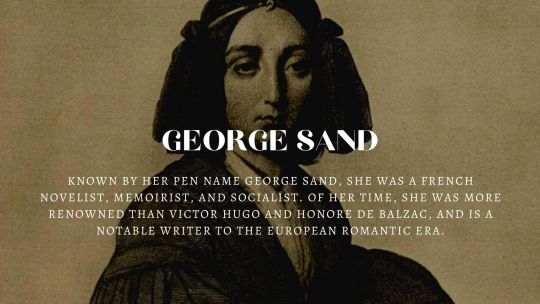








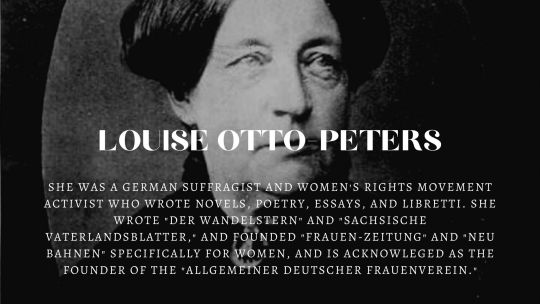
powerful women | german and french writers
#powerful women#germany#france#writers#george sand#marie de rabutin-chantal#stephanie felicite#madeleine de scudery#madame de la fayette#sophie von la roche#ricarda huch#annette von droste-hulshoff#marie luise kaschnitz#louise otto-peters#myedit#mine#aesthetic#graphics#requested#female writers
276 notes
·
View notes
Quote
“Such a silly insipid thing it was! I could have written it better myself,” and at that the too bright colour rushed into her face; and her eyes, which were inclined to look half-shut like those of all her family, opened wide and sparkling; she caught at her friend’s hand and said, “Why do you not write it? Dear Madeleine, do tell my story for me, my very own story.”
“But, Madame, what story?”
“Yes, that is it, what is my story? But there have been so many stories about princesses who never lived long ago, in countries that were never on the map, and you, an author, Madeleine, owe it to your trade to do something new and audacious. Take a real flesh-and-blood princess of the present day for your heroine this time, and tell the truth about her, put in all the faults, as Cromwell told the painter to put in the warts.”
If she could find some pattern, like the measure of a dance, some thread of meaning that should bring together the confused and crowded elements of her life into a whole, then she might not feel that she had lived so foolishly, untidily, so utterly in vain. But perhaps God alone could give this harmony.
Margaret Irwin, Royal Flush
#Margaret Irwin#historical fiction#Henrietta of England#Marie-Madeleine Pioche de La Vergne comtesse de La Fayette#historical figures in fiction
0 notes
Quote
Elle sentit bien que la honte est la plus violente de toutes les passions.
Madame de La Fayette, La Comtesse de Tende
#Madame de La Fayette#Marie-Madeleine Pioche de La Vergne#La Comtesse de Tende#1664#posthume#1723#honte#morale#passion#psychologie
1 note
·
View note
Text
Lista de libros:
Esta es la lista de todos los libros que he leído. Evolucionará a medida que continúe leyendo y a medida que recuerde los títulos. Los libros están separados según el idioma en que los leí (mayoritariamente mi lengua materna, el español).
El asterisco señala el libro que leo actualmente.
Libros en español:
Bruno Gröning durante su vida y hoy - Thomas Eich
Harry Potter and The Philosopher's Stone - J. K. Rowling
El amor en los tiempos del cólera - Gabriel García Márquez
Relato de un náufrago - Gabriel García Márquez
Donde surgen las sombras - David Lozano Gárbala
Mi planta de naranja lima - José Mauro Valladares
El hogar de Miss Peregrine - Ramson Riggs
La ciudad desolada - Ramson Riggs
La biblioteca de almas - Ramson Riggs
Cuentos de peculiares - Ramson Riggs
Aura - Carlos Fuentes
Alicia a través del espejo - Lewis Carroll
El curioso accidente del perro a medianoche - Mark Haddon
Eleanor & Park - Rainbow Rowell
Buscando a Alaska - John Green
Bajo la misma estrella - John Green
The Maze Runner - James Dashner
The Scorch Trials - James Dashner
The Death Cure - James Dashner
Thirteen reasons why - Jay Asher
Divergente - Veronica Roth
Insurgente - Veronica Roth
Allegiant - Veronica Roth
Los juegos del hambre - Suzanne Collins
En llamas - Suzanne Collins
Sinsajo - Suzanne Collins
Ciudades de papel - John Green
Asesinato en el Oriente Express - Agatha Christie
Los diez negritos - Agatha Christie
Mira si yo te querré - Luis Leante
Las ventajas de ser invisible - Stephen Chbosky
La lección de August - Raquel Palacio
Bodas de sangre - Federico García Lorca
La neblina del ayer - Leonardo Padura
Se llamaba Luis - Marina Mayoral
Delirio - Laura Restrepo
La tregua - Mario Benedetti
20 poemas de amor y una canción desesperada - Pablo Neruda
Cartas de invierno - Agustín Fernández Paz
La autopista del sur - Julio Cortázar
El viejo que leía novelas de amor - Luis Sepúlveda
La vida es sueño - Pedro Calderón de la Barca
Don Quijote de la Mancha - Miguel de Cervantes
El burlador de Sevilla - Tirso de Molina
La biblioteca secreta de La Escondida - Leonor Bravo
Matilda - Roald Dahl
Libros en inglés:
Harry Potter and The Chamber of Secrets - J. K. Rowling
Harry Potter and The Prisoner of Azkaban - J. K. Rowling
Harry Potter and The Goblet of Fire - J. K. Rowling
Harry Potter and The Order of the Phoenix - J. K. Rowling
Harry Potter and The Half-Blood Prince - J. K. Rowling
Harry Potter and The Deathly Hallows - J. K. Rowling
Harry Potter and The Cursed Child - J. K. Rowling, Jack Thorne, John Tiffany (*)
Deep Work - Cal Newport
The Hobbit - J.R.R Tolkien
The Murder of Roger Ackroyd - Agatha Christie
The Importance of Being Earnest - Oscar Wilde
Libros en francés:
La Chartreuse de Parme - Stendhal
Songe d’une nuit d’été - William Shakespeare
L’aventure, l’ennui et le sérieux - Vladimir Jankélévitch
L’Odyssée - Homère
Au cœur des ténèbres - Joseph Conrad
Les Misérables - Victor Hugo
Le dernier jour d’un condamné - Victor Hugo
Le Cid - Pierre Corneille
Dom Juan - Molière
Tartuffe - Molière
Le Malade imaginaire - Molière
Andromaque - Jean Racine
Phèdre - Jean Racine
Fables - Jean de La Fontaine
La Princesse de Clèves - Marie-Madeleine de La Fayette
Lettres persanes - Montesquieu
Le Père Goriot - Honoré de Balzac
Madame Bovary - Gustave Flaubert
Les Fleurs du mal - Charles Baudelaire
Bel-Ami - Guy de Maupassant
Le Horla - Guy de Maupassant
Boule de Suif - Guy de Maupassant
Germinal - Émile Zola
Voyage au bout de la nuit - Céline
L’étranger - Albert Camus
Le Petit Prince - Antoine de Saint-Exupéry
Antigone - Jean Anouilh
Robinson Crusoé - Daniel Defoe
Eugénie Grandet - Honoré de Balzac
Micromegas - Voltaire
Interprétation des rêves - Sigmund Freud
Les Poètes Maudits - Paul Verlaine
Les Hauts de Hurlevent - Emily Brontë
La nausée - Jean-Paul Sartre
Fin de Partie - Samuel Beckett
La leçon - Eugène Ionesco
5 notes
·
View notes
Photo

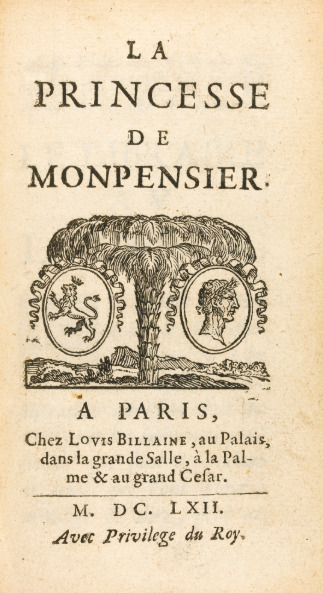
La Princesse de Monpensier
Paris, Louis Billaine, 1662
A French rococo woodcut with the gilt arms of Louis XIV’s emblem on the title-page
Catalog Note:
“1st edition of La Fayette, Marie Madeleine Pioche de la Vergne, comtesse de La Princesse de Monpensier, published anonymously.
Separated from her husband in 1659, Mme de La Fayette settled in Paris, where she enjoyed the friendship of Madame Henriette, sister of Charles II of England and wife of the duc d'Orléans, brother of Louis XIV and one of Mme de La Fayette's principal romances. La Princesse de Montpensier constitutes a study of a political marriage void of love, which ends tragically.”
http://www.sothebys.com/en/auctions/ecatalogue/2012/musical-manuscripts-continental-books-l12406/lot.120.html
#princess#french#french literature#french history#rococo#elegant#vintage#vintage aesthetic#book#books#book cover#antique#antiques#antique books#17th century#17th century literature#literature#classical literature#classical#classical art#Lafayette#Louis XIV#gold#madame#love#marriage#history#parchment#regal#rococo aesthetic
3 notes
·
View notes
Photo

As we’re in the middle of summer and a lot of us have time to read, I thought it would be great to list all the great french books I know and I’ve read if you want to practice french or read french books!! (or just if you don’t have books to read now)
note : the list is faaar from being complete !
POETRY
Apollinaire - Alcools, Calligrammes
André Breton & Philippe Soupault - The Magnetic Fields
Charles Baudelaire - The Flowers of Evil (Les Fleurs du Mal), Paris Spleen (Le Spleen de Paris)
Paul Éluard - Capitale de la Douleur, Les Mains Libres
Paul Verlaine - Poèmes Saturniens, Romances Sans Paroles
Arthur Rimbaud - Illuminations
Victor Hugo - The Contemplations
Stéphane Mallarmé - Poésies
Comte de Lautréamont - The Lay of Maldoror
Louise Labé - Poésies
Pierre de Ronsard - Les Odes
Marceline Desbordes-Valmore - Elegies et romances
Alphonse de Lamartine - The Meditations
NOVELS
Albert Camus - The Stranger, The Plague, The First Man
Jean-Paul Sartre - Nausea, The Words
Annie Ernaux - The Years, The Possession, Shame, Happening, A Woman’s Story
Stendhal - The Red and the Black
Victor Hugo - The Hunchback of Notre-Dame, Les Misérables
Madame de La Fayette - La Princesse de Clèves
Madeleine de Scudéry - Clélie
Honoré de Balzac - The Unknown Masterpiece, Old Goriot
Gustave Flaubert - Madame Bovary, Sentimental Education
George Sand - Story of my Life
Alfred de Musset - The Confession of a Child from the Century
Laurent Binet - HHhH, The Seventh Function of Language
Jean Teulé - The Suicide Shop, Eat Him if You Like, Monsieur Montespan, Charly 9
Voltaire - Zadig, Candide
Chrétien de Troyes - Yvain, The Knight of the Lion + Lancelot, The Knight of the Cart
Marguerite Duras - The Ravishing of Lol V. Stein
Marguerite Yourcenar - Memoirs of Hadrian
Antoine de Saint-Exupéry - Night Flight, The Little Prince, The Wisdom of the Sands
Jean de la Fontaine - The Fables
Émile Zola - The Beast Within
Marcel Proust - In Search of Lost Time
André Gide - The Counterfeiters, The Immoralist, The Vatican Cellars, The Pastoral Symphony
François-René de Chateaubriand - René, Atala, Memoirs from Beyond the Grave
Aragon - Aurélien
Jean-Jacques Rousseau - Reveries of a Solitary Walker
PLAYS
Albert Camus - Caligula, The Just Assassins
Jean-Paul Sartre - No Exit, The Flies, The Chips Are Down
Bernard-Marie Koltès - Return to the Desert, The Night Just Before the Forests
Jean-Luc Lagarce - It’s Only the End of the World
Alfred de Musset - Lorenzaccio
Jean Giraudoux - The Trojan War will not take place, Amphytrion 38, Ondine
Eugène Ionesco - The Lesson, The Bald Soprano, Exit the King, Rhinoceros
Voltaire - Zaïre
Pierre de Corneille - La Place Royale, Le Cid, L’Illusion Comique
Jean Racine - Bérénice, Phèdre
Samuel Beckett - Waiting for Godot
#studyblr#study masterpost#masterpost#bookblr#booklr#books#french literature#french lit#monetstudy#french masterpost#french lit masterpost#book rec#book recommendations#book recs#french langblr#langblr
4K notes
·
View notes
Photo
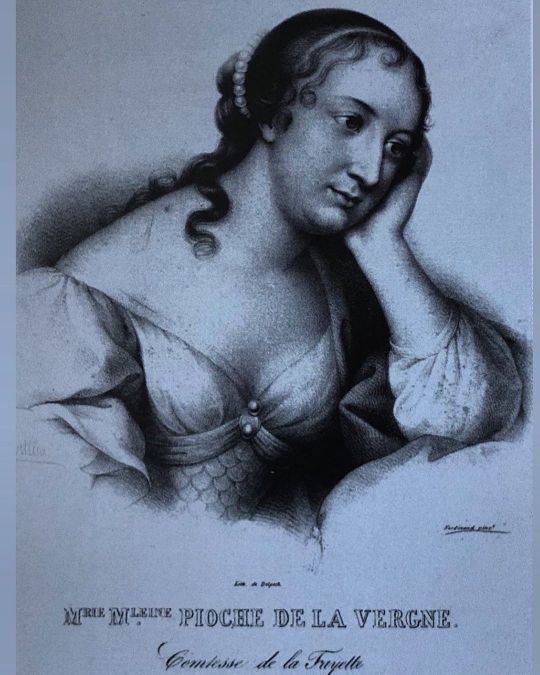
Book: The Princess of Clèves Marie-Madeleine Pioche de la Vergne, Comtesse de la Fayette ————————————- Dates: b. 1634 (France), d. 1693 First Published: 1678 First Published by: C. Barbin (Paris) Original Title: La Princesse de Clèves ———————————- “This profound story of forbidden love enflamed and then resisted until it dies an unnatural death takes place in the court of Henry II of France during the last years of his reign (c. 1558). The young heroine of the title enters a society in which the adulterous love affairs of the powerful and beautiful make up the only important action. Determined to protect the Princess from this world at the same time as including her to it, her mother agrees to an early marriage with the Prince of Clèves whom the Princess respect but cannot love passionately. She then falls utterly in love with the Duc de Nemours, the most sought after man at court, and he with her. Their love is never consummated, nor is it determined by accident or fate; it is both encouraged and resisted in the course of a series of scandalous scenes of intimacy and betrayal that were themselves received as a literary scandal by La Fayette’s own society not merely because they were regarded as implausible, but because of their evident singularity of purpose. In one scene, Nemours, aware that the Princess is watching, steals a portrait of her belonging to her husband. Nemours watches the Princess’ reaction, noting that she does nothing to intervene. In a second, the Princess confessed to her husband that she is in love with another man while Nemours, that man, looks on unobserved and listens to her confession. In a third, Nemours, spied on by a servant of her husband, follows the Princess to her country house where he sees her contemplating a picture in which he is represented. All of these scenes provoke overwhelming and unresolvable turmoil in the Princess but offer the modern reader an experience of compelling narrative and emotional complexity.”(JP) ———————————— #1transcribedtext #1001beforeyoudiecollections #1001beforeyoudiecollection #1001andmore #literature #booklover #books #culture https://www.instagram.com/p/CLcI1j0n1V9/?igshid=hvdwttzjnzwr
#1transcribedtext#1001beforeyoudiecollections#1001beforeyoudiecollection#1001andmore#literature#booklover#books#culture
0 notes
Text
24 Days of La Fayette: December 12th - André Toussaint Delarûe
And we continue our inquiry with one of La Fayette’s French aide-de-camps. He was born in 1768 in France and served La Fayette during his time as commander of the National Guard. Let me tell you, La Fayette knew only praise for Delarûe service. He wrote Alexander Hamilton on December 8, 1797:
His brother [in-law] delarûe, my aide de camp in the national guards one of the cleverest & best young men I ever knew, has married beaumarchais’s daughter—both he & his brother in law are to divide between themselves the payement of the Sums which in the united States are düe to the young lady’s father.
“To Alexander Hamilton from Marquis de Lafayette, 8 December 1797,” Founders Online, National Archives, [Original source: The Papers of Alexander Hamilton, vol. 21, April 1797 – July 1798, ed. Harold C. Syrett. New York: Columbia University Press, 1974, pp. 325–326.] (10/03/2022)
This letter will not only serve us a character assessment but also as the starting point to take a deep dive in some international affairs. Delarûe was the brother of Julie Delarûe. Julie had married Mathieu Dumas. Dumas was a French officer who had fought in the American War of Independence and who had helped organize the National Guard. He was a noted defender of La Fayette’s against allegation of royalist tendencies. Dumas fled France to Hamburg, Lehmkuhlen and Tremsbüttel, among others and even pretended for a time to be a Danish citizen by the name of Elias Funck. After his return to France, he re-entered the army and rose through the ranks.
Delarûe himself married Eugénie Beaumarchaise on July 11, 1796. Eugénie was the only child of Pierre-Augustin Caron de Beaumarchais and his third wife Marie-Thérèse de Willer-Mawlaz. He also had a son, Augustine, by his second wife Geneviève-Madeleine Lévêque (née Wattebled.) But Augustine died young in 1772. Therefore, Eugénie became his sole heiress and after her marriage to André-Toussaint Delarûe, he came Beaumarchais heir and executer.
Now, Beaumarchais was many, many things during his lifetime but he is perhaps best remembered for his works as a librettist, playwriter, author and dramatist. He was also an early supporter of the American Revolution and organized secret French schemes up to a year prior to France’s formal entry in the War. Beaumarchais invested his own money into these schemes and later demanded a compensation from the American government. After his death in 1799, the struggle was continued by his son-in-law Delarûe and Delarûe’s brother-in-law Dumas.
La Fayette was quite invested in Delarûe’s claims and wrote several letters on his behalf. He wrote Thomas Jefferson on November 11, 1800:
As I’ll Have By this Opportunity the pleasure to Write to You, I shall Now only Mention the Affair of M. de BeauMarchais Which You Better know than I do—His Claims Have Been InHerited By a former Aid de Camp of Mine Who Married Beau-Marchais’s daughter and Whose Sister is a Wife to General Dumas the Chief of the Staff in the Middle Army—My Attachement to My two Companions Makes it a duty for me to Give them the Recommendation Which they Have Requested (…) You Have known Mathieu Dumas in the beggining of the french Revolution, and it is probable You Have Seen Delarue, as an Aid de Camp, at My House.
“To Thomas Jefferson from Lafayette, [11 November 1800],” Founders Online, National Archives, [Original source: The Papers of Thomas Jefferson, vol. 32, 1 June 1800 – 16 February 1801, ed. Barbara B. Oberg. Princeton: Princeton University Press, 2005, p. 252.] (10/03/2022)
André-Toussaint Delarûe died in 1863.
As a little fun fact on the side, it appears as if Dumas had a nickname for Delarûe. In a letter to Alexander Hamilton from December 8, 1797, Dumas called his brother-in-law “Edouard”. Now, either Dumas just forgot the name of his brother-in-law (what I have difficulty to believe) or that was perhaps some sort of nickname.
#marquis de lafayette#la fayette#french history#french revolution#american revolution#american history#history#letter#founders online#thomas jefferson#alexander hamilton#mathieu dumas#andré-toussaint delarue#eugénie beaumarchaise#pierre-auguste caron de beaumarchaise#24 days of la fayette#lafayette's aide-de-camps#1768#1797#1796#1772#augustine beaumarchaise#1799#1800#1863
12 notes
·
View notes
Text
Classic literature 1/2
This is the first part of a masterpost about classic french literature, which I have studied in detail in university. P.S. : I don’t expect you to read or even know about those books or authors, this is very advanced knowledge.
Middle age:
Chrétien de Troyes’ arthurian cycle : Lancelot ou le chevalier de la Charrette, Yvain ou le chevalier au lion, Perceval ou le conte du Graal (also le Morte d’Arthur by Thomas Malore if you like knights). it’s a bit long, epic (they fight constantly, even age 80), don’t expect diversity or progressivism but it’s fun. Get it in modern french, old french is a pain
Marie de France (first french female writer!) has written lais (breton legends) + fables, often about love. One focuses on Tristan and Iseut
Adam de la Halle (name of the rooster in Disney’s Robin Hood!) was a troubadour (musician/story teller) who wrote le Jeu de Robin et Marion
?’s Roman de Renart (cf Robin Hood and friends) - fables about an anthropomorphic fox and serial bumhead manipulator called Reynard
Nicolas Flamel’s Livre des figures hiéroglyphiques (you know who)
Guillaume Lorris’ Roman de la rose describes the attempts of a courtier to woo his beloved - possibly the most read book in Europe in late MA
François Villon’s Testament : the immediate prospect of death by hanging and descriptions of other forms of misery and death. Mixes reflections on the passing of time, bitter derision, invective, and religious fervor
Turold(?)’s Chanson de Roland, very famous song, epic poem based on the Battle of Roncevaux in 778, during the reign of Charlemagne

Sixteenth century:
François Rabelais’ Pantagruel + Gargantua, the story of two giants, a dad and then his son - clever, funny, carnivalesque, sometimes gross
Joachim Du Bellay’ les Regrets + Théodore Agrippa D’Aubigné’ Tragiques (v pretty) + Pierre de Ronsard’ i (sexist af) + Louise Labé’ Elégies, poetry
Michel de Montaigne’s Essais (three books, quite abstract) - describes human beings and himself, with utter frankness and honesty, finds the great variety and volatility of human nature to be its most basic features, which resonates to the Renaissance thought about the fragility of humans (‘I have never seen a greater monster or miracle than myself’)
Marguerite de Navarre’s Heptaméron, collection of 72 short stories, many deal with love, lust, infidelity, and other romantic + sexual matters
?’ Satire Ménippée, political + satirical work criticizing the excessiveness of the Catholic League during the Wars of Religion in France + defending the idea of an independent but Catholic France
Seventeenth century:
Honoré d’Urfé’s l’Astrée, story of the perfect love between two shepherds, the heroine Astrée and her lover Céladon
Madeleine de Scudéry’s Clélie, most popular novel of the century, best remembered for the “the map of love” (carte de Tendre), long description of a country, metaphor of the landscape of human emotion
Molière’s l’Ecole des femmes, theatrical comedy about 42 yo Arnolphe, who has groomed young Agnès since age 4 and moves her to one of his abodes at age 17, hoping to bring up her to make her too ignorant to be unfaithful (all of Molière’s work, really)
Jean Racine’s Phèdre, Bérénice, Britannicus, Andromaque
Pierre Corneille’s Le Cid, Médée, L’Illusion comique, Oedipe
François de La Rochefoucault’s Maximes, quotes (ex: XXIX. If we had no faults, we would not take so much pleasure in noticing those of others)
Jean de La Fontaine’s Fables, VERY famous, often uses animals, the kind of stuff you have to memorize at school when you’re 9
Nicolas Boileau’s Art poétique (4 books) and its famous quote Whatever is well conceived is clearly said ; first + last consist of general precepts, inculcating mainly common sense ; second treats of the pastoral, elegy, ode, epigram + satire ; third of tragic + epic poetry
Marie-Madeleine de la Fayette’s Princesse de Clèves, a well raised and religious girl gets married with A and falls in love with B
Jean de La Bruyère’s Caractères, insightful commentary on contemporary French society (pejorative/petty portraits of ‘fictional’ people)
Paul Scarron’s Roman comique, where lovers Fate and Star join a theatre company to run away from financial problems
François de Malherbe’s poetry (Boileau said And finally Malherbe came, big mood), here Il n’est rien de si beau
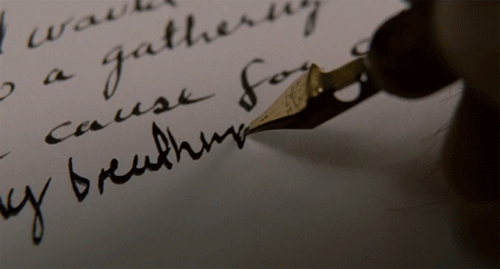
230 notes
·
View notes
Text
Spotlight on... the 11th Earl and Countess of Northumberland
In this new series of posts, we will look at a few details from the lives of members of the Percy family who were part of Alnwick Castle's history.
First up are Josceline Percy, 11th Earl of Northumberland, and his countess Elizabeth (also known as Betty).
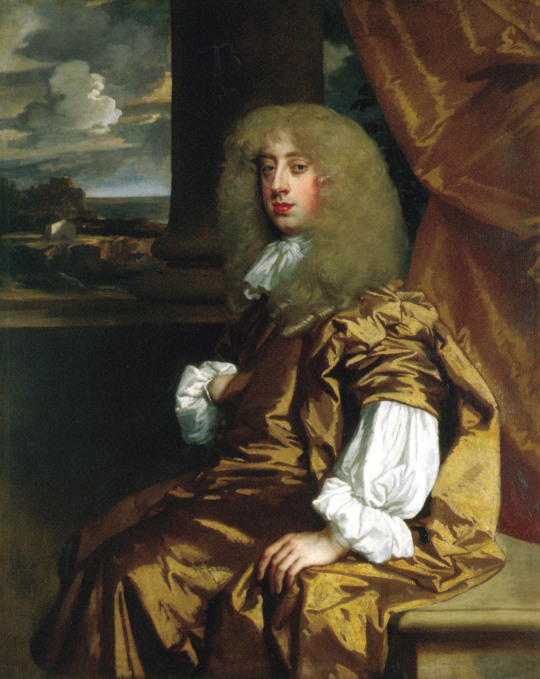
Josceline Percy, 11th Earl of Northumberland (1644-1670)
Josceline, born in 1644, was the subject of a large commitment by his father, the 10th Earl, to his training and education, in order to make Josceline “a citizen to his country”. The 10th Earl also negotiated a marriage for his son, to a lady named Audry Wriothesley who he “judged... to be of a Nature, Temper and Humour likely to have made him an excellent wife, which would have brought me much comfort in the latter part of my life”.
The 10th Earl’s use of “would” above is due to the fact that Audry died before the marriage could take place. Her sister Elizabeth, or Betty, would instead be selected as Josceline’s wife.

Algernon Percy, 10th Earl of Northumberland
----------------------------------------------------------------------------------------------------
WHO WERE AUDRY AND BETTY WRIOTHESLEY?
The Wriothesley sisters were daughters of the 4th Earl of Southampton. Southampton’s father, the 3rd Earl, was the famous Wriothesley who patronised William Shakespeare, and to whom two of Shakespeare’s longer poems are dedicated (the only known occasions when Shakespeare directly wrote as himself).
Betty would also stand to inherit an annual sum of £5000 from her grandfather the Earl of Chichester.
----------------------------------------------------------------------------------------------------
Josceline appeared to be ill quite frequently. One letter he wrote to his tutor, Dr Mapletoft, states "I believe that few persons have suffered more in diseases without dying than I have done. I did not stir one inch from the place I was in for 22 days, being kept first 14 or 15 by the smallpox, and then by a fever which was, in my opinion, much the worse of the two."
Four months later, another letter mentions “a very high fever, which afterwards proved to be the scarlet fever”. Though Josceline died in his late twenties, he seems to have been lucky to have survived as long as that!
He seems to have had some level of self-awareness, too. An additional letter to Mapletoft has Josceline declaring “I hear so little of truth from anybody, that I am the last man that learns of anything amiss concerning myself”.
Betty was known for her beauty - Samuel Pepys described her in his Diary as “a beautiful lady indeed!” - but her marriage to Josceline was delayed due to his repeated illnesses.The marriage took place on the 23rd December, 1662: Josceline was in his late teens, and Betty was a couple of years his junior.
Their first child was born in 1666, which must have been a relief to the 10th Earl, who was apparently becoming concerned at the absence of an heir to continue the Percy family line. However, the child was a daughter, Elizabeth, and the couple only received a ‘grudging congratulation’ from the Earl. In 1668, very shortly before the Earl’s death, a son was born, and the continuation of the earldom was assured. Unfortunately, the son died in infancy.
When the 10th Earl died, Josceline became 11th Earl of Northumberland, and Betty his Countess. He received many letters expressing condolences for his father’s death, including one from the future King James VII and II.
--------------------------------------------------------------------------------------------------
WHAT DID JAMES WRITE?
In his letter to Josceline, the future King wrote:
“It will not be necessary for me to use many words to persuade you how sensibly I am touched with the loss you have made of your father, since you know so well the kindness that I have for your whole family... I do assure you you shall find the continuance of my kindness for you upon all occasions; and as I lost in him a very good friend, so I hope I shall find you as much so as he was, since you will always find me your most affectionate friend...”
----------------------------------------------------------------------------------------------------
The new Earl’s health did not improve, and when a second daughter died in 1670, he and the pregnant Betty decided to travel abroad, accompanied by their friend and physician, the learned philosopher John Locke.
Once they had reached Paris, Locke and the Countess remained - she was unable to conduct a long journey all at once - but the Earl continued to Rome. He was described as having “heated himself with travelling... for many days”, and by the time he reached Turin he had caught a fever which resulted in his death in his late twenties.
A few weeks after Josceline’s death, Betty gave birth to a stillborn child. Their only surviving daughter, three year old Elizabeth, inherited all the titles and lands that were transmissible to her as a female heir.

Elizabeth Percy, daughter of Josceline and Betty, later Duchess of Somerset
Betty, at the age of 25, was now a widow who had lost a husband, a son and a daughter within five months. She returned to England, but found herself under the imperious attention of her commanding mother-in-law, as well as romantic attentions from suitors - she was, after all, renowned for her great beauty, as well as her youth, high rank and wealth. She moved again, and began to live in Paris, but found suitors there too.
One of these suitors was William Seymour, 3rd Duke of Somerset, who died in 1671, aged 21, apparently “at grief for the unkindness” of Betty, “whom he had long courted in vain”. The most famous one, however, was the English Ambassador in Paris, Ralph, Lord Montagu.
The courtship of Montagu and Betty became a frequent subject of correspondence among the aristocratic ladies of France at the time, including Madame de Sevigne, now considered one of the most iconic letter-writers in French literature, and the author Madame de la Fayette, who jealously found the Countess badly-dressed and without any grace, and who wondered what Montagu saw in her! Men, however, found plenty to admire about Betty.
----------------------------------------------------------------------------------------------------
DE LA FAYETTE? I KNOW THAT NAME...
The most famous Lafayette is probably the Marquis de Lafayette, who fought in the American Revolution and is currently a major character in Lin-Manuel Miranda’s musical Hamilton. He is descended from the Madame de la Fayette who was so disparaging about the widow Betty Percy - but how?
Madame de la Fayette’s son, the marquis Rene-Armand, bequeathed the name and property of the House of Lafayette to his distant cousin Charles Motier de Champetieres in 1692 - Rene-Armand’s brother was an abbot, and he had no sons. However, his daughter Marie-Madeleine did inherit the Lafayette lands.
Charles’ son Edouard took the name of Lafayette, and it was Edouard’s son Jacques to whom Marie-Madeleine transmitted the Lafayette lands on her death in 1717. Jacques was her cousin, and was only aged 6 at the time. When Jacques died in January 1734, his brother Michel became the Marquis de Lafayette - and as Michel was born on 13th August 1731, he was only two years old at the time!
Finally, Michel’s son Gilbert du Motier became marquis on his father’s death, travelled to America, and became the Lafayette so involved with the revolutions across the world at the end of the 18th century.
----------------------------------------------------------------------------------------------------
Montagu, who later became Duke of Montagu, had a reputation of being irresistible, but Betty was not won over easily. It took Montagu some considerable time to court her, even refusing to do so much as look at other known beauties in case he offended her. Eventually, his attempts to woo her succeeded, and they married in autumn 1673.
However, as soon as the marriage was announced, Betty’s mother-in-law, the formidable Dowager Countess of Northumberland, claimed custody of her daughter Elizabeth citing a clause in Josceline’s will.
Betty, now Lady Montagu, protested, implored, and attempted to resist, but was not successful, and the Percy heiress was transferred from her mother to a much stricter guardian. The young Elizabeth had been in the care of her father’s old tutor, Dr Mapletoft, and Betty wrote to him, declaring:
“I desire that you would stay to come with her; for I shall not be at ease if you are not with her. And pray take care to defend her from her grandmother, who has not so much civility left as to come and speak to me herself; but by a letter has let me know that she does expect to have her delivered up; if not, she must use force. Poor child! Pray God send her health, and protect her from all the designs that are upon her at this time.”

Elizabeth ‘Betty’ Wriothesley, Countess of Northumberland and later Duchess of Montagu
Though their time together was short, and Josceline’s life equally so, the 11th Earl and Countess of Northumberland are an essential part of Percy family and Alnwick Castle history. They can be seen as the end of one era, that of the earldom of Northumberland, and the beginning of another, where the Percy family line, and that of Alnwick Castle, would become more complicated and eventually culminate in the dukedom of Northumberland in 1766.
3 notes
·
View notes
Text
Some of my favorite quotes from, Madame, a life of Henrietta, Daughter of Charles I, and Duchess of Orleans. by Julia Mary Cartwright Ady
The House of Commons sent an address of congratulation on her arrival, with a present of 10,000 jacobuses, upon which Henrietta wrote a graceful letter of thanks to the Speaker, begging him to excuse her want of facility in the English tongue, but assuring him that she had not lost her English heart.
The young Queen was in delicate health, and too stiff and formal to take an active part in society. Madame soon found herself the leader of the fashionable world, and the Tuileries became the centre of the Court. All the men were at her feet, all the women adored her. Foremost among her admirers, was the King himself. For the first time, he recognised the charms which in his early youth he had refused to own, and declared aloud that he must have been the most unjust of men, not to think Madame the fairest and best of women. He paid daily visits to his young sister-in-law, and took increasing delight in her com pany.
Among the ladies who formed part of Madame's intimate circle, were several of the wittiest and handsomest women of the day. There was the widowed Duchesse de Chatillon, famous for her intrigues in the Fronde, and said to be the only woman who had ever touched the great Conde's heart. Bablon, as she is familiarly called in Henrietta's letters, had, at one time, caught Charles II.'s roving fancy, and had incurred Mademoiselle's jealousy, by boasting that she might one day be Queen of England. In this respect, her ambition had been disappointed, but she remained intimate with Madame and her royal brother, who kept a soft corner in his heart for his old flame. And there was the Duchesse de Cr6qui, and Mademoiselle de Mortemart, better known in after days as Madame de Montespan, and Madame de Monaco, daughter of the Marechal de Gramont and sister of Monsieur's prime favourite, the handsome Comte de Guiche.
The other was Madeleine de la Vergne, the young Mar quise de La Fayette, [..] Although some ten years older than Madame, she remained her most intimate friend and confidant to the end of her life, and it speaks well for the lively young Princess, that she should have been so deeply attached to one whose tastes and habits were so different from her own.
It is interesting, as one of the very few private letters we have from the pen of Louis XIV., and shows the pleasant terms on which he was with his young sister-in-law. " Fontainebleau, Friday. " If I wish myself at Saint-Cloud it is not because of its grottoes or the freshness of its foliage. Here we have gardens fair enough to console us, but the company which is there now, is so good, that I find myself furiously tempted to go there, and if I did not expect to see you here to-morrow, I do not know what I should do, and could not help making a journey to see you. Remember me to all your ladies, and do not forget the affection which I have promised you, and which is, I can assure you, all you could possibly desire, if indeed you wish me to love you very much. Give my best love to my brother. " To my sister."
Under these circumstances, it was hardly to be wondered if Madame found pleasure in the companionship of the King. His natural ascendency of character might well captivate the fancy of a maiden barely yet seventeen years old. Here was a Prince, full of great schemes and noble ambitions, ready to share his dreams with her, and to seek her sympathy. The mutual attraction which drew them together was heightened by their mutual discontent. The friendship which sprang up between them had all the flavour of romance. They wrote verses that were read and applauded by the whole Court, and sent each other little notes, innocent enough in themselves, but which raised suspicion in other breasts. Significant looks were exchanged, and mysterious whispers passed from one to another. Courtiers ventured to express their regret that Madame did not hold a more exalted place at Court, and to hint that, had the King known her better a year or two ago, he would have made her his Queen. But for the moment, Monsieur was too well amused with the novelty of his own position, and the importance which he acquired from his wife's influence with the King, to show any signs of resentment.
On hot afternoons, Madame would drive out, attended by all the ladies of the Court, to bathe in one of the clear streams which flow through the forest, and then ride back on horse back in the cool of the evening. The King himself, followed by his suite, would come to meet her and escort her home. Henrietta was a fearless rider, and never looked better than when, mounted on her horse and wearing a gold-laced habit and coloured plumes in her shady hat, she appeared at the head of this brilliant cavalcade. Long after Madame was dead and gone, the recollection of those joyous processions, wind ing their way through the leafy glades in the bright evening light, lived among the fairest memories of the Sun-King's Court.
Or else the King would lead the way to the Her mitage de Franchard, or some such picturesque spot in the forest, where a dainty collation was served under the trees, and the sound of horn and clarion woke the echoes of the rocks. After supper, the royal party would embark on a richly-decorated gondola and float down the waters of the canal, to the strains of Lulli's wonderful violins, and the great Conde, and other Princes of the blood, would hand refresh ments to the Queen and princesses.
There were hunting expeditions in the woods, moonlight serenades prolonged far on into the night, and lonely rambles into the depths of the forest. Strange were the sights the stars looked down upon, strange the tales that were whispered under the spread ing boughs of the ancient beeches. In all of these hunting parties or moonlight walks, the King was Madame's com panion. She shared all his tastes, and entered into all his plans, with a spirit and a vivacity of which the poor, dull Queen was utterly incapable.
So sang the chorus in Benserade's flattering verses, as the King sank on bended knee before Madame, and owned her Queen of Beauty, amid the applause of the whole Court.
Three days later, at an early hour on the 27th, she gave birth to a daughter. The event was premature, but passed off happily. Her mother was with her at the time, and before six o'clock, the King and the two Queens arrived to offer Madame their congratulations. Both parents, however, were greatly disappointed at the child's sex, and Madame, on hearing she had given birth to a daughter, is said to have exclaimed, " Then throw her into the river ! " Her mother-in-law was much scandalised at these lamenta tions, and by way of consoling Madame, observed that if she had not given birth to a prince, her little daughter, who was but a few months younger than the baby Dauphin, might some day yet become a Queen.
#i'm living for this entire thing#i have many many more but right now i'm gonna stop and focus on jane eyre#outoflight
2 notes
·
View notes
Quote
Cette trahison lui fit horreur : la honte et les malheurs d'une galanterie se présentèrent à son esprit ; elle vit l'abîme où elle se précipitait, et elle résolut de l'éviter.
Madame de La Fayette, La Comtesse de Tende
#Madame de La Fayette#La Comtesse de Tende#Marie-Madeleine Pioche de La Vergne#1664#posthume#1723#amour#galanterie#vertu#éthique#morale#trahison#honte
0 notes
Photo
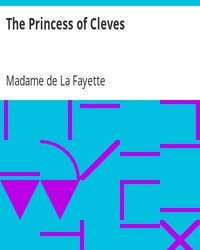
The Princess of Cleves by La Fayette, Madame de (Marie-Madeleine Pioche de La Vergne) https://ift.tt/2ROKys8
0 notes